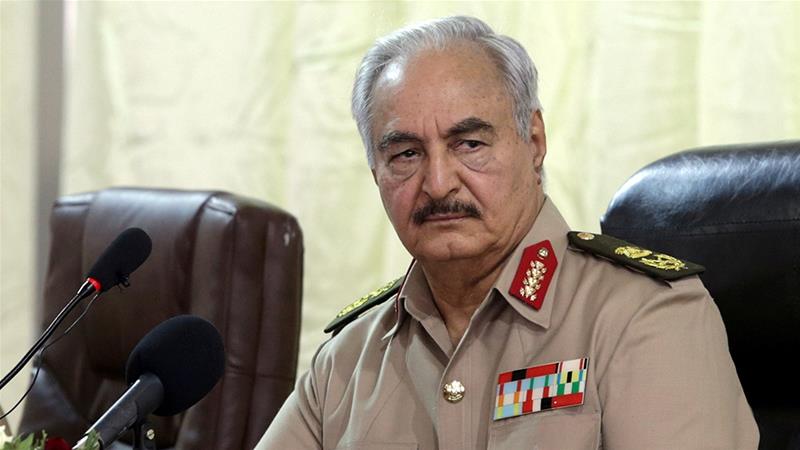The rout of the Libyan warlord Khalifa Haftar continues apace with forces of the Government of National Accord (GNA) lifting the siege of Tripoli on 4 June. The following day the city of Tarhuna, a key staging ground for Haftar’s attack on the Libyan capital, was taken. Over the week-end of 6-7 June fighting continued around the coastal city of Sirte, 450 kilometres to the east of Tripoli.
In two Gulf cities there are two very different reactions to the collapse of Haftar’s campaign to unite Libya under his command. In Abu Dhabi, the United Arab Emirates de facto ruler Mohammed Bin Zayed will be watching with a degree of alarm. The UAE, along with Egypt, Russia and France, has been the primary supporter of the warlord both militarily and diplomatically.
In Doha, which has supported the internationally recognised Tripoli-based Government of National Accord (GNA) and Prime Minister Fayez al-Sarraj, there will be satisfaction that with the intervention of Turkey on behalf of the GNA the tide of the war has turned dramatically.
With the now three year old Gulf feud as a backdrop – the UAE, Saudi Arabia, Bahrain and Egypt are lined up against Qatar – it is unsurprising that Libya has become a proxy diplomatic war between Doha and Abu Dhabi. The latter was the prime instigator of the air, sea and land blockade launched against Qatar 5 June 2017 while the former welcomed the support of Turkey in ameliorating the worst impacts of the blockade.
On 8 June, Qatar emphatically reiterated its support for Sarraj and the GNA with the Qatari foreign minister telling Le Monde that Haftar “has always favoured violence and appears to only be concerned with a political process when he is losing; however, he returns to the use of force and violence shortly thereafter.”
That shot was aimed more at Abu Dhabi than the warlord. It was a response to a call by the UAE’s minister of state for foreign affairs in a tweet on 20 May, made as the rout of Haftar’s forces was gaining speed, for “an immediate, comprehensive cease-fire and a return to the political process.”
A measure of the extent of Haftar’s defeat was the news that the giant Sharara oil field in the southwest of the country has restarted production. The field which is capable of pumping 300,000 barrels per day was blockaded for four months by Tuareg forces fighting with Haftar. But as the Libya analyst Jalel Harchaoui, responding to a Reuters report, commented in a tweet:
“’Ali Kanna, a guard commander aligned w/ the internationally recognized #GNA entered #Sharara without resistance on Saturday.’ The #Tuareg groups from #Awbari in charge of #Sharara simply switched. In Nov, Kanna had tried the same. His attempt was a failure before it even began”
The significance of the Tuareg going over to the GNA now, having failed to do so in November, should not be lost on Haftar’s backers in Abu Dhabi. The ragtag coalition of mercenaries, remnants of the Gaddafi forces and Haftar’s tribal units is coming apart at the seams. Whatever pretensions Haftar had to be the new hard man of Libya, whatever belief Mohammed Bin Zayed had that he could achieve that aim are now shown to be what they probably always were: a folly and an illusion.
The question now, as the battle for Sirte continues, is how far the UAE will go in supporting him as the Turks reinforce their influence in Libya with every battlefield victory. When Haftar launched his offensive to take Tripoli in April 2019 the assumption of his foreign supporters was that no outside forces would come to Sarraj’s aid even though the GNA was and remains the internationally recognised government. America wasn’t interested, Europe made noises of concern but nothing more and the UK government, embroiled in Brexit, simply shrugged its shoulders.
Haftar’s backers, most notably the UAE, neglected to consider the opportunity that Libya presented to Turkey’s President Erdoğan. In November 2019 he and Sarraj signed a memorandum of understanding that laid claim to maritime zones in the Eastern Mediterranean. It was a bold move aimed at blocking Greek and Cypriot claims to offshore hydrocarbon resources that the Turks consider theirs. No doubt Haftar, had he won would at the behest of the Emiratis – who have many grievances with Turkey – have torn that deal up. However, with Sarraj’s forces faltering, the Turks stepped up their military assistance enabling the GNA to go on the offensive in March and subsequently chalk up a string of victories that has led to the collapse of the Haftar offensive.
Within Libya, opposition to Haftar in Benghazi can be expected to grow, particularly among the merchant class and all those who have suffered at the hands of a leader who has enriched his family and supporters while employing a mixture of corruption and brutality to institute a climate of fear in the city. His coalition of tribes which had proved potent in his rise will unravel. His mercenaries are either melting away or going over to the other side. What then for Abu Dhabi? The Emiratis may decide that now is not the time, nor is Libya the place to up the ante against the Turks. In a humiliating U-turn they may be forced to cut Haftar loose and accept a peace deal that favours the GNA. For their part, the Qataris will be quietly satisfied that in backing Sarraj they have chosen the right side, though their detractors in the Gulf will no doubt accuse them of bowing to the will of Erdoğan.


